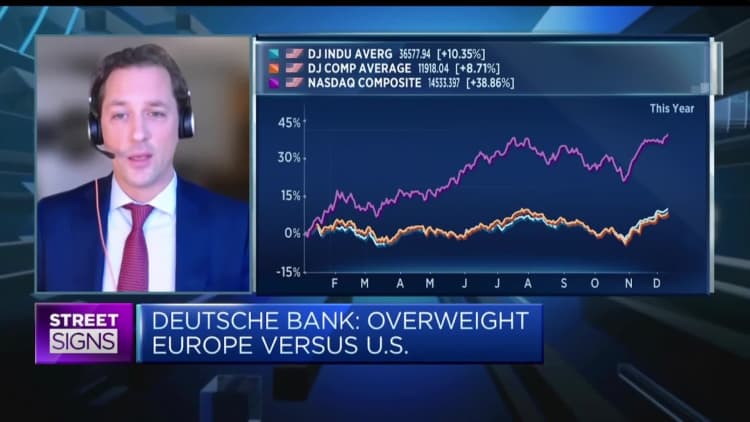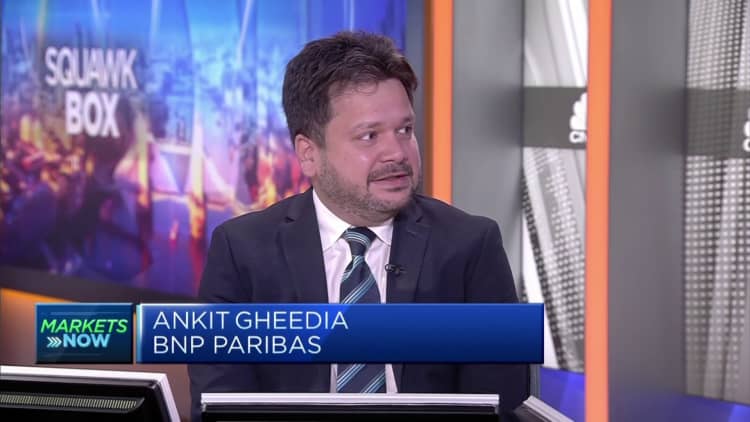LONDON — Markets have entered a "new paradigm" as the global order fragments, while heightened recession risk means that "bonds are back," according to HSBC Asset Management.
In its 2024 investment outlook, seen by CNBC, the British lender's asset management division said that tight monetary and credit conditions have created a "problem of interest" for global economies, increasing the risk of an adverse growth shock next year that markets "may not be fully prepared for."
HSBC Asset Management expects U.S. inflation to fall to the Federal Reserve's 2% target in late 2024 or in early 2025, with the headline consumer price index figures of other major economies also set to drop to central banks' targets over the course of next year.
The bank's analysts expect the Fed to begin cutting rates in the second quarter of 2024 and to trim by more than the 100 basis points priced in by markets over the remainder of the year. They also anticipate that the European Central Bank will follow the Fed, and that the Bank of England will kickstart a cutting cycle but will lag behind its peers.
"Nevertheless, headwinds are beginning to build. We believe further disinflation is likely to come at the price of rising unemployment, while depleting consumer savings, tighter credit conditions, and weak labour market conditions could point to a possible recession in 2024," Global Chief Strategist Joseph Little said in the report.
A new paradigm
The rapid tightening of monetary policy by central banks over the last two years, Little suggested, is leading global markets towards a "new paradigm" in which interest rates remain at around 3% and bond yields stick around 4%, driven by three major factors.
Firstly, a "multi-polar world" and an "increasingly fragmented global order" are leading to the "end of hyper-globalisation," Little said. Secondly, fiscal policy will continue to be more active, fueled by shifting political priorities in the "age of populism," environmental concerns and high levels of inequality. Thirdly, economic policy is increasingly geared towards climate change and the transition to net-zero carbon emissions.

"Against this backdrop, we anticipate greater supply side volatility, structurally higher inflation, and higher-for-longer interest rates," Little said.
"Meanwhile, economic downturns are likely to become more frequent as higher inflation restricts the ability of central banks to stimulate economies."
Over the next 12 to 18 months, HSBC AM expects investors to place greater scrutiny on corporate profits and the ongoing debate over the "neutral" rate of interest, along with a heightened focus on labor market and productivity trends.
'Bonds are back'
Markets are now largely pricing a "soft landing" scenario, in which major central banks return inflation to target without tipping their respective economies into recession.
HSBC AM believes the increased risk of recession is being overlooked and is positioning for defensive growth alongside a prevailing view that "bonds are back."
"A weaker global economy and slowing inflation are likely to present a supportive environment for government bonds and challenging conditions for equities," Little said.
"Therefore, we see selective opportunities in parts of global fixed income, including the U.S. Treasury curve, parts of core European bond markets, investment grade credits, and securitised credits."
HSBC AM is cautious on U.S. stocks, due to high earnings growth expectations for 2024 and a stretched market multiple — the level at which shares trade versus their expected average earnings — relative to government bond markets. The report analysis sees European stocks as relatively cheap on a global basis, which limits downside unless a recession materializes.
"Japanese stocks may be an outperformer among developed markets, in our view, due to attractive valuations, the end of unconventional monetary policy, and a high-pressure economy in Japan," Little said.

He added that idiosyncratic trends in emerging markets also warrant a selective approach rooted in corporate fundamentals, earnings visibility and risk-adjusted rewards. If the Fed cuts rates significantly in the second half of 2024 as the market expects, Indian and Mexican bonds and Chinese A-share stocks — domestic shares that are dominated in yuan and traded on the Shanghai and Shenzhen exchanges — would be some of HSBC AM's top emerging market picks.
India's post-pandemic rebound and rapidly growing markets and Japan's continued exit from unconventional monetary policy render them as attractive sources of diversification, Little suggested, while Chinese growth is widely projected at around 5% this year and 4.5% in 2024, but could also benefit from further fiscal policy support.
"Asian equities are in a stronger position in terms of growth and are likely to remain a relative bright spot in the global context," Little said.
"Regional valuations are generally attractive, foreign investor positioning remains light, while stabilising earnings should be the key driver of returns next year."
Asian credit should also enjoy a much better year as global rates peak, most regional economies perform well and Beijing offers an additional fiscal boost, he added.

